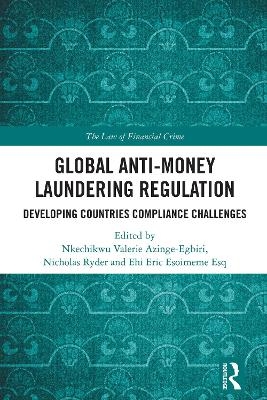
Global Anti-Money Laundering Regulation
Routledge (Verlag)
978-1-032-18288-9 (ISBN)
This book explores the politics of money laundering and terrorist financing (ML/TF) regulation in several countries across Africa and the Small Island States. Developed countries created the Financial Action Task Force (FATF) to combat ML/TF globally. Expectedly, the FATF’s standards mirror existing banking regulations within the G7 countries. Yet, the standards apply to all countries irrespective of the limited ML/TF risks they pose to the global economy, their weak pre-conditions for effective regulation and their non-involvement in the FATF’s framing. Still, such countries, mainly within the Global South, have worked hard to amplify their compliance with the regime due to fears of the repercussions of their non-compliance. This collection demonstrates how the global ML/TF regulation is treated as an implicitly superior legal regime where the Global South must comply irrespective of their perception of the FATF’s legitimacy challenges. It shows that beyond exogenous factors such as neo-colonialism, endogenous factors such as weak institutions and corruption undermine the compliance trajectory of the Global South. Furthermore, it analyses the unintended consequences of transplanting FATF standards into diverse legal and cultural contexts. The volume contributes to our understanding of the challenges of transplantation from the Global North and how the Global South is steering within the constraints created by the FATF. It advocates for a comprehensive understanding of the nuanced compliance challenges of developing countries. It further proposes practical solutions to address them, emphasizing the importance of risk-based understanding, accountability, capacity-building and coordination in achieving effective anti-money laundering and counter-terrorist financing measures. The collection will be essential reading for researchers, academics and policy-makers working in financial crime regulation and international economic law.
Nkechikwu Valerie Azinge-Egbiri is Lecturer in Business and Commercial Law at Lancaster University, England. Nicholas Ryder is Professor in Financial Crime at the School of Law and Politics, Cardiff University, UK. Ehi Eric Esoimeme Esq. is Professor of Business Law and Ethics at James Hope University, Lagos, Nigeria; Rudolph Kwanue University College, Liberia; and Kennedy University of Baptist, United States.
1. The Challenges of the Global Anti-Money Laundering and Counter-Terrorist Financing (AML/CFT) Regime for Developing Countries; 2. Uncovering Conflicts and Ambiguities In the International Anti-Money Laundering Regime Vis-à-vis African Countries; 3. GIABA: Combatting Money Laundering/Terrorism Financing in West Africa; 4. Do Things Fall Apart? (Black)listing and Its Implications for Developing Countries; 5. The mis-implementation of anti-money laundering laws and regulations: A high-level review with specific focus on the unilateral termination of customers’ bank accounts in South Africa; 6. Implications of Botswana’s Legal Culture in the Implementation of the AML/CFT Regime and Prosecution of Money Laundering/ Financial Crimes; 7. Barriers To Implementing New Technologies for AML/CFT Functions: The Case of Nigeria; 8. Challenges to AML Compliance Within Nigerian Financial Institutions; 0. The Challenge of Money Laundering by Nigeria PEPs: Beyond the Transplantation of FATF Standards; 10. The Vulnerability Of Politically Exposed Persons (PEPs) In Africa: Towards Transparency In Beneficial Ownership; 11. Can FATF’s Focus on Beneficial Ownership Aid Anti-Corruption Efforts in a ‘Low-Capacity’ Country? Challenges From the Front Line in Nigeria; 12. Suspect Wealth and the Compliance Willingness of Small States; 13. Combatting Terrorist Financing: A War Developing Countries Cannot Win?; 14. Asset recovery in developing countries: Assessing successes and failures and overcoming challenges; 15. Strategic Tools for Amplified AML/CFT Compliance in Developing Countries
| Erscheinungsdatum | 02.11.2024 |
|---|---|
| Reihe/Serie | The Law of Financial Crime |
| Zusatzinfo | 7 Tables, black and white; 9 Line drawings, black and white; 9 Illustrations, black and white |
| Verlagsort | London |
| Sprache | englisch |
| Maße | 156 x 234 mm |
| Gewicht | 771 g |
| Themenwelt | Recht / Steuern ► EU / Internationales Recht |
| Recht / Steuern ► Steuern / Steuerrecht | |
| Recht / Steuern ► Strafrecht ► Kriminologie | |
| Recht / Steuern ► Strafrecht ► Strafverfahrensrecht | |
| Recht / Steuern ► Wirtschaftsrecht ► Bank- und Kapitalmarktrecht | |
| Sozialwissenschaften ► Soziologie ► Spezielle Soziologien | |
| Wirtschaft ► Volkswirtschaftslehre ► Wirtschaftspolitik | |
| ISBN-10 | 1-032-18288-1 / 1032182881 |
| ISBN-13 | 978-1-032-18288-9 / 9781032182889 |
| Zustand | Neuware |
| Informationen gemäß Produktsicherheitsverordnung (GPSR) | |
| Haben Sie eine Frage zum Produkt? |
aus dem Bereich


